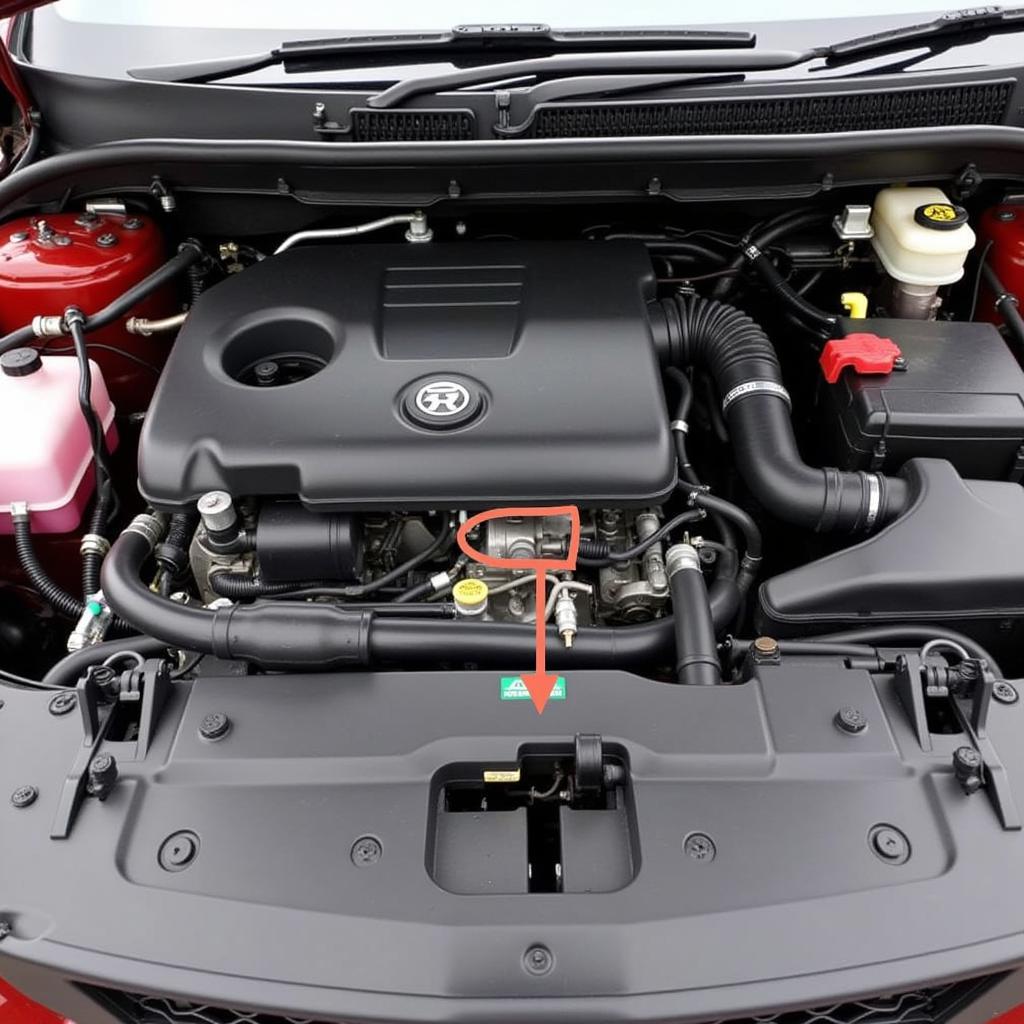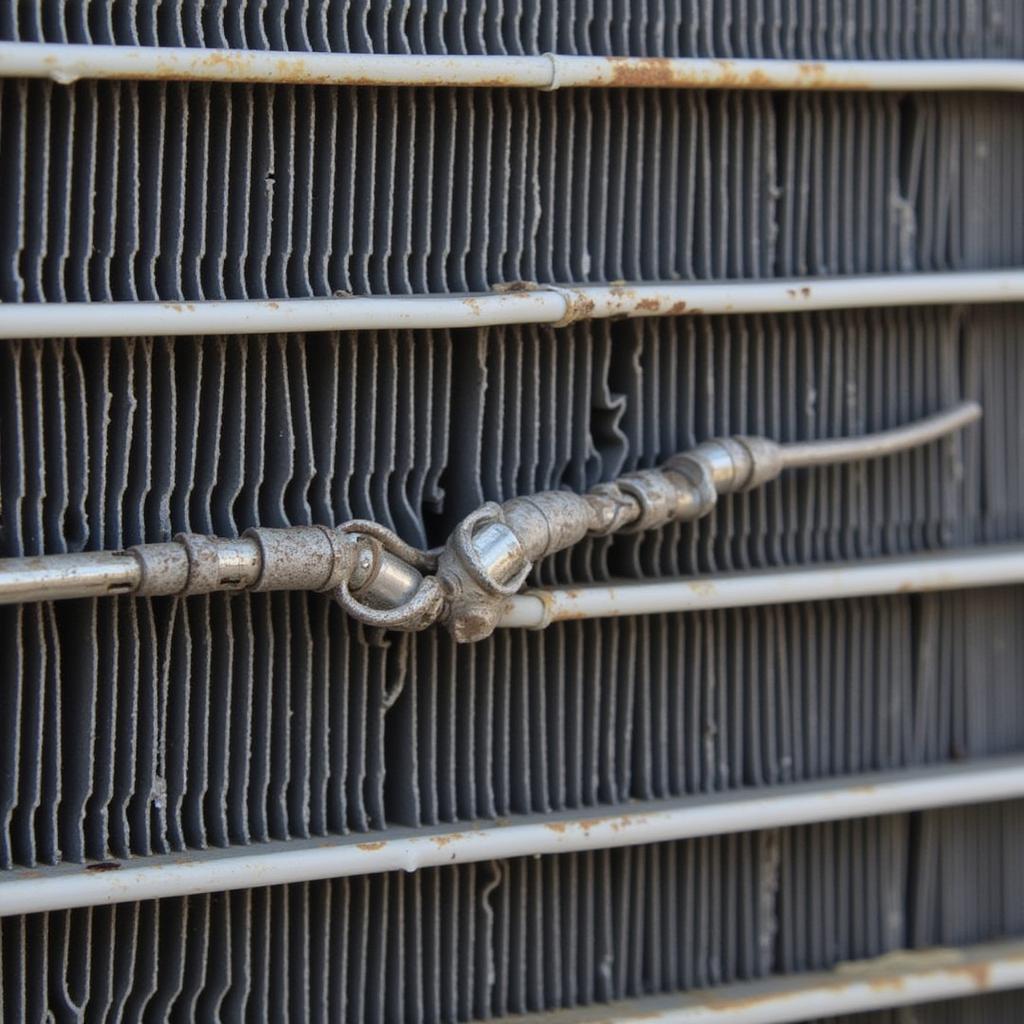One of the most frustrating things that can happen during summer is your car’s AC system failing. While some AC issues might require a professional mechanic, others, like a failing condenser, might be something you can potentially address at home with the right knowledge and tools. If you’re wondering “How To Fix A Car Ac Condenser At Home,” this guide is for you. We’ll delve into the steps involved, potential challenges, and when it’s best to call in a professional. Remember, safety and accurately diagnosing the issue are paramount before attempting any repairs.
 Car AC Condenser Location
Car AC Condenser Location
Understanding Your Car’s AC Condenser
Before we dive into the “how to fix a car ac condenser at home” process, it’s crucial to understand what this component does. The condenser is responsible for transforming the hot, high-pressure refrigerant gas from the compressor into a cooler, high-pressure liquid. This process is vital for your AC system to function correctly, blowing cool air into your car’s cabin.
Common AC Condenser Problems
A failing AC condenser can manifest in several ways:
- Warm air from the vents: This is often the first and most obvious sign. If your AC is blowing warm air, it suggests the condenser might not be cooling the refrigerant properly.
- Pressure buildup: Excessive pressure in the AC system, often due to a blockage in the condenser, can lead to leaks or even component failure.
- Visible damage: Physical damage to the condenser from road debris, accidents, or corrosion can affect its functionality.
 Damaged Car AC Condenser
Damaged Car AC Condenser
Is Fixing a Car AC Condenser at Home Feasible?
While there are online guides claiming to teach you “how to fix a car ac condenser at home,” the reality is more complex. The process requires specialized tools, knowledge, and handling of refrigerant, which can be dangerous if mishandled.
Repairing a car AC condenser often involves:
- Discharging the AC system: This requires a specialized machine to safely remove the refrigerant.
- Removing and replacing the condenser: This involves disconnecting hoses, potentially removing other components for access, and ensuring a leak-free seal when installing the new condenser.
- Vacuuming the system: Before recharging, the system needs to be vacuumed to remove air and moisture, which again necessitates a specialized pump.
- Recharging the system: This involves adding the correct amount and type of refrigerant using a manifold gauge set.
Attempting these steps without the right equipment and expertise can lead to further damage, leaks, or even pose health risks.
Learn more about the process of how to fix your ac in the car.
When to Call a Professional
Given the complexities involved in fixing a car AC condenser, it’s generally recommended to consult a qualified mechanic. This is especially true if:
- You are not comfortable working with car AC systems.
- You lack the specialized tools required for the job.
- The condenser damage is extensive.
- You suspect other AC components might be faulty.
It’s also important to remember that refrigerant is a hazardous material. Mishandling it can lead to environmental harm and potential health issues.
Preventing AC Condenser Issues
While fixing a condenser might require professional help, there are preventive measures you can take:
- Regular Inspections: Have your car’s AC system inspected annually by a qualified mechanic, especially before the summer months.
- Clean the Condenser: Regularly clean any debris, leaves, or dirt that might accumulate on the condenser fins.
- Address Leaks Promptly: If you notice any signs of refrigerant leaks, such as hissing sounds or a sweet smell, get your AC system checked immediately.
By understanding the complexity of the task and following these preventive tips, you can avoid finding yourself frequently searching for “how to fix a car ac condenser at home” and enjoy a comfortable driving experience year-round.
If you’re curious about the cost of getting car air conditioner fixed, don’t hesitate to reach out to us.
FAQs
Q1: Can I drive my car with a damaged AC condenser?
While you technically can drive with a damaged condenser, it’s not recommended. Driving with a faulty condenser can lead to further damage to your AC system, potentially leading to more costly repairs down the line.
Q2: How long does a car AC condenser last?
The lifespan of a car AC condenser can vary depending on factors like driving conditions, maintenance, and the quality of the component itself. However, on average, you can expect a condenser to last around 7-10 years.
Q3: Can a leaking condenser be repaired?
While minor leaks can sometimes be repaired by a qualified technician, a severely damaged or corroded condenser typically requires replacement.
Q4: How much does it cost to replace a car AC condenser?
The cost of replacing a car AC condenser can vary depending on the make and model of your vehicle and labor costs in your area. On average, you can expect to pay between $400 and $950 for a condenser replacement, including parts and labor.
For a comprehensive breakdown of the costs associated with car AC repairs, you can check out our detailed guide on how much it cost to get ac fixed in car.
Q5: How can I prevent my car AC condenser from failing?
Regular maintenance is key to preventing premature condenser failure. Ensure your AC system is inspected annually, the condenser is kept clean, and any leaks are addressed promptly.
Need help with your car’s AC? Contact AutoTipPro at +1 (641) 206-8880 or visit our office located at 500 N St Mary’s St, San Antonio, TX 78205, United States.




Leave a Reply